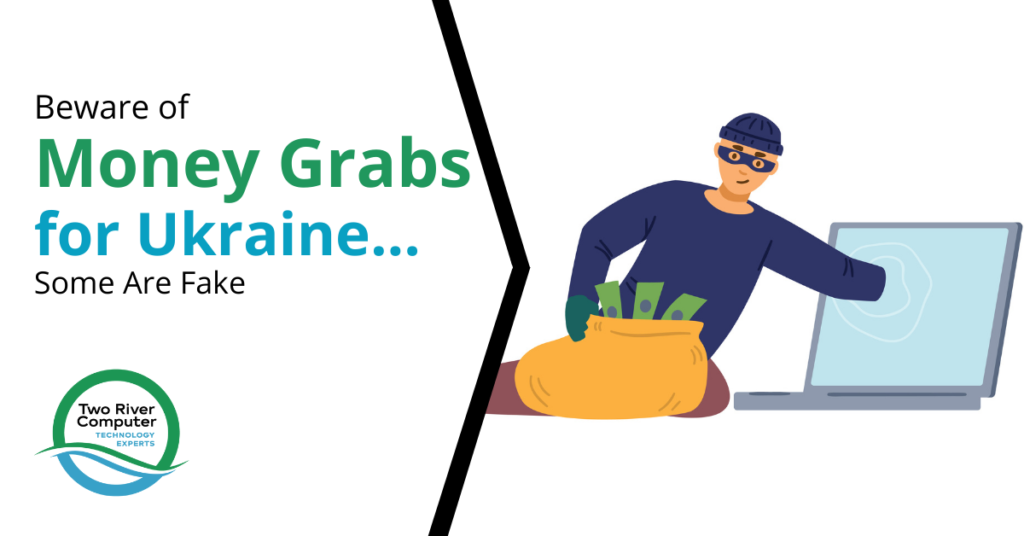
The war in Ukraine has captured worldwide attention. It’s nearly all you see on the news, no matter what station you’re watching.
This is a dire humanitarian crisis, and many people around the world want to do their part to help those displaced in any way that they can. But unfortunately, it’s just this kind of situation that scammers take advantage of.
This hurts everyone involved. Scammers make off with money that someone meant to send to help those in Ukraine, thus the real charities that are actually helping people get less than they should.
The person that is trying to help, can end up with a lot of problems. Not only do they not help the cause they wanted to help, but they can also have their credit card details stolen, be targeted for identity theft, and have their device infected with malware from a fake charity phishing website.
Why do scammers take advantage like this?
Here are a few reasons:
- Heightened emotions mean that people often give without first checking out the cause.
- The situation is in the news every day and the images keep getting more devastating. The criminals see this as advertising for their fake charity scams.
- People naturally want to give to help out, and there may be new givers that aren’t very adept at researching an organization first.
- Scammers can make off with a lot of money during a crisis like this.
In early March, Newsweek reported that there were already fake Ukraine charity sites multiplying all over the internet. Some of the scam domains included, supportukraine.today, ukrainesolidarity.org, tokenukraine.com, and help-for-ukraine.eu.
There’s no shortage of domains that scammers can purchase to fool people into thinking a site is legitimate. They trick people into donating with sad images of the war-torn country that they send in phishing emails or post on social media.
Your own social media connections can share these scam posts without realizing it, which helps the scammers even more because it lends legitimacy to the message.
Ways That You Can Avoid Falling for a Fake Ukraine Charity Scam
It’s wonderful to want to help those in need. Here are some ways you can ensure that your donation actually gets to those that need it and that you don’t fall for a scam.
Don’t Fall for Flashy or Compelling Images
Some people will trust an email or website if it looks good. If it uses an attractive layout and compelling images, they will assume that it must be legitimate.
This isn’t the case at all. Scammers can hire design professionals just like anyone else. And they’ll often simply copy the emails and images that a legitimate charity is using.
Don’t trust a site just because the scammer made their phishing scam look good.
Research Before You Give
It’s critical to research a charity before you donate to them. They will often use sound-alike names that are close to that of a legitimate charity so people will mistake them for one they’ve read about elsewhere.
Make sure you do a check on them before you give, this ensures your money is actually going to help people and not in the pocket of an opportunist taking advantage of the misfortune of others.
Here are a few places you can check the legitimacy of a charity:
- Charity Navigator
- IRS Tax-Exempt Status Search (for U.S.-based charities)
- GuideStar
Visit Websites Directly, Not Through a Link
Phishing scammers often impersonate brands, and the same goes for charitable organizations. That email that says it is from United Way may use the organization’s logo and look like it came from the right email address, but it could be a fake.
If you click the link, it could take you to a scam site that steals your money and your personal details at the same time.
Always visit sites directly instead of going through a link in an email, text message, or social media message. This way you can ensure you’re on the right website and not a phishing site created to fool you.
Steer Clear of Vague Information About the Organization
Scammers will usually not give a lot of details about either where the money you give them is supposed to go or about the organization itself.
Beware of organizations that have vague information and also those that claim 100% of the proceeds go to charity. Legitimate charitable organizations have a support staff and at least some administrative costs. So, unless they give a very good reason why in most cases the claim of 100% going toward the cause is a red flag.
Think Your Device May Be Infected From a Phishing Site?
If you think you might have landed on a phishing site and want to make sure your device isn’t infected, give us a call. Two River Computer provides expert support for Fair Haven businesses and consumers. We can take a look at your device remotely or in person.
Contact us today for a free consultation. Call 732-747-0020 or reach us online.


